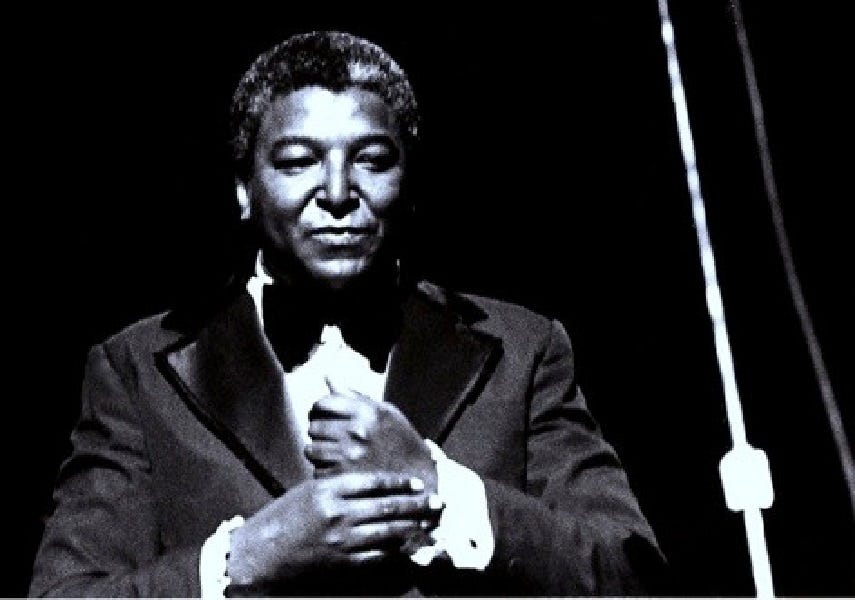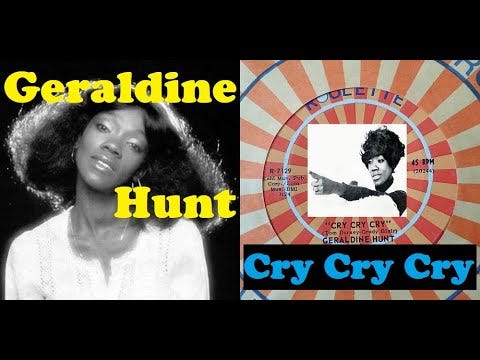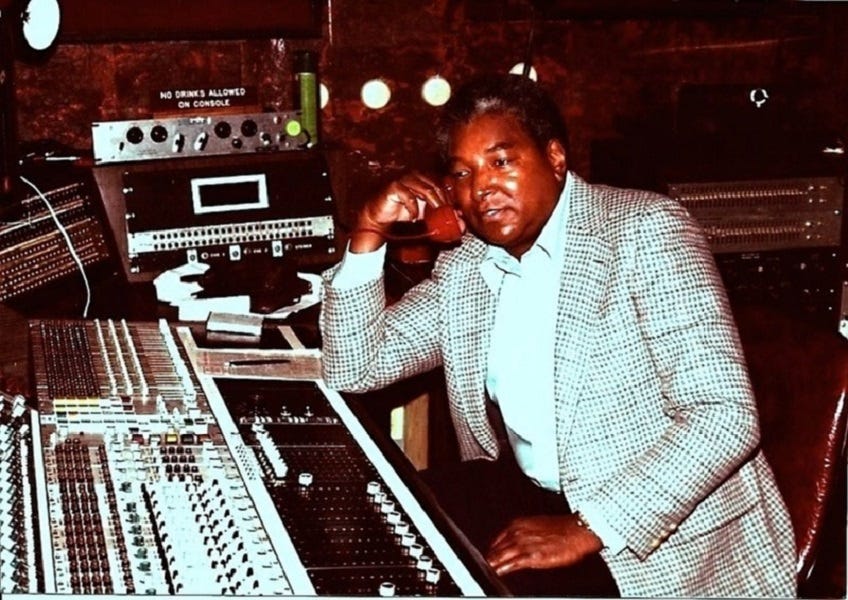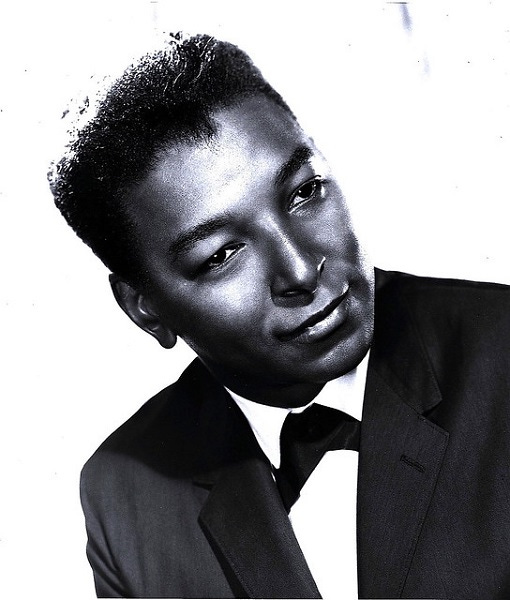Bobby Martin (May 4, 1930 – September 6, 2013) – Love Is The Message (1973)
The unsung co-creator of the Sound of Philadelphia arranged Philly soul classics like this much-beloved message song that helped define the early disco era.
View most updated version of this post on Substack
Search our full archives
Bobby Martin was an immensely talented songwriter, arranger, composer, and producer, and one of the unsung creators of the Sound of Philadelphia. He began working with Kenny Gamble and Leon Huff in the mid-sixties, and arranged many of the classic Philly soul productions they produced. He was also the bandleader and conductor for MFSB, the house band of their most successful label Philadelphia International Records.
Born in Lockland, Ohio, and raised in Cincinnati, as a child Robert L. Martin taught himself to play guitar and piano and first performed at church meetings. He wrote music for the school band during high school and started leading his own groups. After seeing Lionel Hampton perform at a dance, he also taught himself to play vibes.
Martin joined the Lynn Hope Quintet jazz group in the late 1940s. He moved to Philadelphia a few years later, and it was there that he would make his mark. Trying to create a hit record, he wrote and arranged songs for local artists. As a result his house became a hangout for aspiring singers and musicians.
Around 1955 he first met a 13-year-old boy who was always there with a group of friends, but kept in the background, not saying anything. At some point Martin asked, “Who is that guy who’s always listening?” The answer was Kenny Gamble.
When Martin began arranging for the R&B group the Dreamlovers in 1961, he began to encounter the same kid, now a young man, hanging around the halls of the Schubert Building in downtown Philly. It was the city’s version of the Brill Building, full of songwriters, producers, promoters, and other music industry professionals, and Martin worked there with producer Jerry Ross. Gamble would regularly greet him by calling out “Hello Bobby Martin!”
Also in 1961, Martin was hired as the A&R director at local label Newtown Records. Among his first signings was young singer Patricia Louise Holt, aka Patti LaBelle, and her group the Ordettes, soon renamed the Blue Belles. He had discovered her the previous year. Martin went on to write and produce several of the group’s early hits, which by 1962 included new members Nona Hendryx, Sarah Dash, and Cindy Birdsong. But Newtown’s owner Harold Robinson refused to credit him as a producer, and he left the label in 1963.
One of his assistants during this period was Morris Bailey, who would later become a noted songwriter and producer in his own right, writing classics including Nina Simone’s “(You’ll) Go To Hell” (1967). Martin “had a style,” Bailey told music historian John A. Jackson for his excellent 2004 book A House On Fire: The Rise And Fall Of Philadelphia Soul. “He was really a great arranger and producer…probably the greatest horn part writer on the whole planet.”
Martin, Bailey and singer Jean Wells co-wrote the superb jam “After Loving You” in early 1967, arranged by Chris Towns and produced by Clyde Otis. It was released that April on Calla Records, a Roulette subsidiary run by the infamous Nate McCalla, bodyguard and muscle for mob-connected Roulette owner Morris Levy. The following year, it was covered by organist Truman Thomas who recorded a funky instrumental version, produced by George Butler and arranged by Richard Tee.
For more on McCalla and Levy, see our earlier post on Geraldine Hunt who had her first minor hit on Calla in 1970.
In late 1967, when Gamble had become a songwriter/producer and indie label owner in his own right alongside his musical partner, keyboardist Leon Huff, Martin tried unsuccessfully to get him to release some tracks he had produced. He thought he wouldn’t hear from Gamble again. But before long, Gamble surprised him with a call, saying “Martin, I got some work for you. I’m recording the Intruders and I want you to do some arranging.”
The track they were recording was “Cowboys to Girls,” co-written and produced by Gamble and Huff and arranged by Martin. Released in March, 1968 on Gamble Records, it charted within weeks. After being added to influential New York City radio station WABC’s playlist, hundreds of other stations around the country followed suit. It peaked at #1 R&B, #6 on the Billboard Hot 100, and went gold by May, selling over a million copies. It was their first national hit record, and from then on Martin was Gamble and Huff’s primary arranger (although he later shared that unofficial title with Thom Bell).
Martin also continued working with other artists. Later in 1968, he co-wrote the funky instrumental “Do the Train,” credited to the Willis Wooten Ork, co-written with J. C. Hill aka Frank Virtue, the owner of Virtue Studios where it was recorded, and label owner J. Harvey Stiles, aka John Harvey Styles. It was the B-side to unknown artist Willis Wooten’s “Your Love Is Indescribably Delicious,” a super funky jam written by bassist Ronnie Baker who co-arranged it with Norman Harris, both of them soon to be core original MFSB members, the house band for Gamble and Huff’s future label Philadelphia International Records (PIR). The single was co-produced by Virtue and Styles.
Thom Bell and Martin co-arranged Jerry Butler’s “Only The Strong Survive” in the spring of 1969, which Butler co-wrote with producers Gamble and Huff. It was the biggest hit of his career and became his signature song, spending two weeks at #1 R&B and reaching #4 on the Hot 100.
That same year, Martin arranged both sides of a single for the vocal group Honey & the Bees, released on legendary WDAS DJ Jimmy Bishop’s Artic Records and produced by Bishop. The superb soul/funk bomb “Baby, Do That Thing” was co-written by Bishop, Bernard Broomer, and Norman Harris, b/w the slow jam “Sunday Kind of Love,” which they performed live on a local Philly TV show. The group’s lead singer was Nadine Felder, sister of future prolific Philly soul songwriter Allan Felder who co-wrote many classics with Harris and others.
In 1971, Kenny Gamble and Leon Huff launched their new label Philadelphia International Records. They had the financial backing of Columbia Records courtesy of a deal Gamble and Huff brokered with the larger label’s president Clive Davis. At the time, Columbia was highly motivated to establish its own soul music division, but realized the only way they were going to do business with Gamble and Huff was “through their own label,” in the words of Columbia promotion head Ron Alexenburg.
According to John A. Jackson, who interviewed Martin multiple times in 2000 and 2002 for his book, he was an invaluable part of Gamble and Huff’s hitmaking team:
“The producers would present Martin with a taped demo of an artist, usually accompanied by Huff’s piano. Martin then wrote the charts, whereby he ‘sketch(ed) out the rhythm section, all the breaks and everything. And then, when they went into the studio, I would conduct and Kenny and Huff would fill in what they wanted.’ During the actual recording, Martin’s job was ‘to keep the beat going, to make sure in was in the pocket. After we’d get the rhythm cut - and we cut some real hot tracks - then Kenny and Huff would put the voices on there.’ It was then Martin’s job to add strings and/or horns to the recording.”
(L-R) Don Renaldo, Kenny Gamble, and Bobby Martin
Starting in the early seventies, Martin arranged or co-arranged a series of classic albums that Gamble and Huff produced. Together with Thom Bell and Lenny Pakula, he co-arranged Laura Nyro and LaBelle’s Gonna Take A Miracle (1971) on Columbia, and Billy Paul’s second LP Going East, released on their newly launched Philadelphia International Records that same year. Martin, Pakula and Harris co-arranged PIR’s breakthrough album Back Stabbers (1972) by the O’Jays, with Martin solely responsible for the arrangement on the LP’s closing cut, the global unity anthem “Love Train.” Released as the album’s third single in December, 1972, it went to #1 R&B and #1 on the Hot 100, the only number one pop hit the O’Jays ever had and the song that closes their concerts to this day.
The label shot a powerful, heartwarming music video to promote it, filmed around Amtrak’s Northeast Corridor in early 1973. It remains a testament to the fact that in an alternate, funkier universe, there should have been an early, Black version of MTV that launched in the seventies as an hour-long weekly show. Possibly produced by Don Cornelius as another piece of his Soul Train empire (and welcoming artists of all colors as long as they were funky, just as Soul Train did), the ratings could have been so huge that it might have expanded to an entire channel. With the concept of cable TV conceived then and there, America’s living rooms would have been funked up for decades to come.
Martin, Pakula and Harris co-arranged Billy Paul’s 1972 album 360 Degrees of Billy Paul, with Martin arranging another million-seller, the #1 R&B and Hot 100 hit “Me and Mrs. Jones.” He also solely arranged the LP’s two best songs, its socially conscious opening cut “Brown Baby,” for which another original music video was produced, and “Am I Black Enough for You,” the ill-advised follow up single to “Me and Mrs. Jones.” For more on both these songs, see our earlier post on Billy Paul.
He and Pakula also arranged Paul’s next album War of the Gods (1973), with Martin responsible for the uplifting #9 R&B single “Thanks For Saving My Life” and its epic ten-minute title track.
Martin arranged most of MFSB’s breakthrough second album, Love Is The Message (1973) which went to #1 on the R&B album charts. This included “TSOP (The Sound of Philadelphia)” with the Three Degrees on backing vocals, the first song they ever recorded for PIR. Commissioned as the new Soul Train theme, it went to #1 R&B and #1 on the Hot 100.
He also arranged the title track, co-written and produced by Gamble and Huff, again featuring the Three Degrees. Although it was not a hit, stalling out at #42 R&B and #85 on the Hot 100, it became one of the decade’s most well-known message songs, and one of the most influential Philly soul records of all time. It was a block party staple for years, and a signature record for countless disco DJ’s, especially Nicky Siano at the Gallery and David Mancuso of the Loft.
Happy Heavenly Birthday to the great Bobby Martin.
Further info:
“Independent Producer of the Month: Bobby Martin,” New On The Charts, February, 1980.
A House On Fire: The Rise And Fall Of Philadelphia Soul, by John A. Jackson, Oxford University Press, 2004.
“RIP Bobby Martin, Purveyor of Fine Philadelphia Soul,” obituary, Philadelphia Magazine, September 10, 2013.
“RIP, Philly International Records producer, arranger and composer Bobby Martin,” WXPN, September 11, 2013.
“A Case for Arrangers' Rights,” Berklee Today, Summer 2014.
#soul #funk #Philly #PIR #MFSB #KennyGamble #LeonHuff #BobbyMartin










I always enjoy your music maker chronicles!
Too right! ❤️✊🏾
>>>"It remains a testament to the fact that in an alternate, funkier universe, there should have been an early, Black version of MTV that launched in the seventies as an hour-long weekly show. Possibly produced by Don Cornelius as another piece of his Soul Train empire (and welcoming artists of all colors as long as they were funky, just as Soul Train did), the ratings could have been so huge that it might have expanded to an entire channel. With the concept of cable TV conceived then and there, America’s living rooms would have been funked up for decades to come."<<<